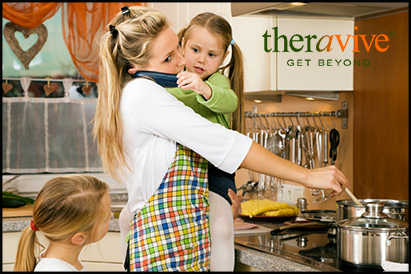 It Takes A Village
It Takes A Village
It really does take a village to raise kids, and the number of single-parent homes in the U.S. has almost doubled in the past 50 years (Anderson, 2013). Without support, single moms can be left feeling tired, overwhelmed, guilty, depressed, and even resentful of their children and the world, in general. Parenting is a full-time job that can be emotionally overwhelming, with no paid vacation or sick time to ease the stress. Appreciation is hard to come by, and single moms can feel alone and stressed. Research also tells us that single mothers are also more susceptible to developing mental illnesses like depression (Carpenter, 2011).
A number of factors can cause single mothers to be more at risk of depression and other mental illnesses, as compared to mothers with partners to share the burden. Single mothers often bear the full responsibility for raising their kids, including financial support. In a 2012 article for The Nation, Greg Kaufmann cited a report that shows that “single mothers in the United States—most of whom are either separated or were previously married—are employed more hours and yet have much higher poverty rates than their peers in other high-income countries.” Single moms are working harder, but still experiencing very high rates of poverty.
Single moms may also neglect their own health because of their responsibilities, or downplay symptoms of depression or anxiety. They may also fear that disclosing symptoms of a mental illness will call into question their ability to effectively parent their children. Some may even fear losing their kids if they share how they really feel, and any difficulties they are having with day-to-day responsibilities (Carpenter, 2011)
Challenges for Single Mothers
Life as a single parent can be depleting and overwhelming. Every day is a challenge, and real, consistent support can be hard to find. Some mothers are fortunate to have extended family nearby who can help share the burden, but sometimes family is far away, or not in a position to help. Some of the challenges faced by single mothers include:
-
Staying emotionally and physically healthy and staying positive: This can be very challenging with all of the demands placed on a single mother. Getting to the gym and preparing healthy meals may take a backseat to work and parent-teacher conferences.
-
Finding affordable, reliable and safe childcare: Too often, single mothers are forced to leave their children in less-than-ideal child care situations, or risk losing their employment. Older children may also wind up being the childcare provider for younger siblings (the Challenges of Single Parenthood, 2014)
-
Finding time for adult friendships: Even if single mothers find the time, they may be too exhausted to enjoy time with adult friends.
-
Working two or more jobs to make ends meet: Single parents and their children often live on less money than they did when they lived with a partner. Some single mothers may have to work an extra job because it provides health insurance benefits for their family.
-
Coping with children’s behavioral problems: The single parent household can be stressful for everyone, and children may act out in response to the separation from a parent, moving to a new town or school, and adjusting to less time with their parent.
-
Balancing time for work and children’s’ activities and events: Working several jobs is sometimes necessary, making it difficult to spend time with children and attend their activities.
-
Managing relationships with ex-partners navigating co-parenting: After about the first year following a divorce, many fathers stop seeing their children on a regular basis—and sometimes altogether. That increases the pressure on single mothers and interferes with the child's long-term adjustment (The Challenges 2014).
That is a tremendous list of tasks for a single mother to balance, and sometimes mental and physical health becomes the last priority. In fact, single mothers are more at risk to develop common types of mental illness than are women who have partners.
 Increased Risk for Mental Illness
Increased Risk for Mental Illness
There are many causes for mental illness, including biological, social, and emotional factors. Being a single mother can be incredibly stressful, and stress can contribute to the development of mental illness, or aggravate existing mental health problems. In one study, single mothers were found to have more incidences of moderate to severe mental disability than women who had partners to help with parenting. Financial hardship and lack of social support were two factors thought to contribute to the increased incidence of mental illness (Crosier, Butterworth, & Rodgers, 2007).
Another study echoes these findings and shows that both single mothers and single fathers are more at risk for mental illness, with single mothers being the most at-risk. They also reported significantly more stress than parents with partners. Factors leading to the increased stress include unemployment, lack of financial resources, and having pre-school aged children. Single mothers seem to be worse off financially than single fathers, with 46% of mothers reporting financial hardships, compared with 23% of single fathers. (Pelzer, 2013). So when a single mother develops symptoms of mental illness, how can she cope and be an effective parent for her kids?
Single Parenting with Mental Illness
Parenting is a difficult balancing act regardless of the situation. However, when a single mother is also coping with a mental illness, the challenges of parenting are increased. Living with a mental illness can result in compromised functioning, just like living with cancer or diabetes can. Depending on the condition, single mothers with mental illness may struggle with things like: sleep problems, attention and concentration issues, moodiness, fatigue, or irritability. Research has also shown that mothers with depression are less likely to interact with their children in active ways, which can impact their relationship with their child, and the child’s emotional, cognitive and language development (Tartakovsky, 2011).
There is a tremendous pressure on parents to be perfect, and some single mothers must also face the stigma associated with having a mental illness. It’s important for them to resist the temptation to ignore their symptoms and avoid treatment. With the right support, it is possible for single mothers with mental illness to overcome the challenges and have happy homes and healthy kids. These tips can help single mothers with mental illness be the best parents they can be:
-
Focus on the mental health of the whole family: Watch for signs of mental illness in kids, as research has shown that children of parent with a serious mental illness are more at risk for developing mental illness themselves. One study found that 30-50% of children with a parent with mental illness went on to develop a mental illness, as compared with 20% of children in the general population (Tartakovsky, 2011).
-
Engage in mental health treatment: Some single mothers are reluctant to do this because of work obligations, finances, or stigma. They may also fear losing their children. It is an unfortunate fact that parents with mental illness are more likely to lose custody of their children than parents who do not have a mental illness. This makes it essential that single moms with mental illness access all available resources to maintain their mental health (Recovery & Support, 2014). However, seeking help is a sign of strength, and a good example for children. Counseling can help single mothers manage their stress and develop coping and parenting strategies. Counselors can also help single mothers to access resources to help with practical problems like accessing food, housing and medical care.
-
Stay connected to others: Living with mental illness can be isolating. It’s important for single mothers with mental illness to stay connected with people who are safe, supportive, and understand the challenges of single parenting. This may be family, friends, clergy, or mental health professionals. Support groups can also be an excellent resource for single mothers, and can help them feel less alone.
-
Create a crisis plan: Mental health emergencies can occur, and it’s important to create a crisis plan, in consultation with doctors and counselors. This plan will tell people what to do in the event of a crisis (e.g. hospital preference, medication list, childcare options, and employment contacts) (Tartakovsky, 2011).
-
Ask for help and prioritize. Single mothers with mental illness, like all single mothers, sometimes need to ask for help. They need to know when they can’t do it all on their own, and they need to accept that some things just won’t get done. If it comes down to preparing a fancy dinner, or working on a child’s science project, well, that fancy dinner just may not happen!
-
Practice excellent self-care: Again, single mothers often place their own well-being on the bottom of their list of priorities. Getting enough rest, exercising, and eating a healthy diet is essential. No one is at their best when they are ill, mentally or physically, and staying healthy is the best way to be a happy and effective parent.
These tips can help single mothers with mental illness balance their many responsibilities, and maintain their quality of life with their children. Although single mothers may be more at-risk for developing mental illness, the fact that a parent has a mental illness is not enough, by itself, to cause problems for children or the family. What’s more important is how the parent manages the illness and their family relationships.
_________________________________________________________________________________________________________________________________
Anderson, Kirsten. "The Number of US Children Living in Single-parent Homes Has Nearly Doubled in 50 Years: Census Data." LifeSiteNews.com, 4 Jan. 2013. Web. 19 May 2014. http://www.lifesitenews.com/news/the-number-of-children-living-in-single-parent-homes-has-nearly-doubled-in
Carpenter, M. (2011, April 28). Facts about single parenting and mental health. Retrieved June 30, 2014, from http://www.examiner.com/article/facts-about-single-parenting-and-mental-health
Crosier, T., Butterworth, P., & Rodgers, B. (2007). Mental health problems among single and partnered mothers. The role of financial hardship and social support. Social Psychiatry and Psychiatric Epidemiology, 42(1), 6th ser., 6-13. Retrieved July 8, 2014, from http://www.ncbi.nlm.nih.gov/pubmed/17203237
Kaufmann, G. (2012, December 21). This week in poverty: US single mothers-'The worst off' The Nation. Retrieved July 7, 2014, from http://www.thenation.com/blog/171886/week-poverty-us-single-mothers-worst
Pelzer, I. (2013, December 16). Single mothers most at risk of poor mental health. Medical Press. Retrieved July 8, 2014, from http://medicalxpress.com/news/2013-12-mothers-poor-mental-health.html
Recovery & Support. (2014). Retrieved July 8, 2014, from http://www.mentalhealthamerica.net/recovery-support
Tartakovsky, M. (2011). Tips for Parenting with a Mental Illness. Psych Central. Retrieved on July 09, 2014, from http://psychcentral.com/lib/tips-for-parenting-with-a-mental-illness/0005765
The Challenges of Single Parenthood. (2014, June 26). Retrieved July 6, 2014, from http://www.healthychildren.org/English/family-life/family-dynamics/types-of-families/Pages/The-Challenges-of-Single-Parenthood.asp